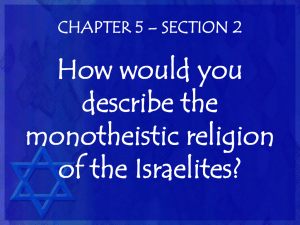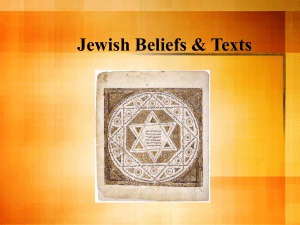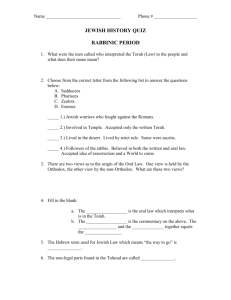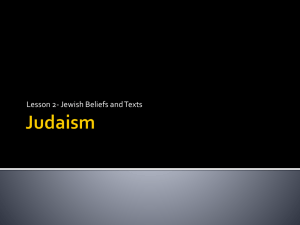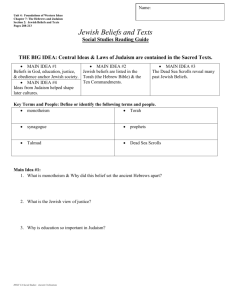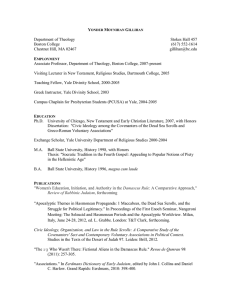Judaism 20
advertisement
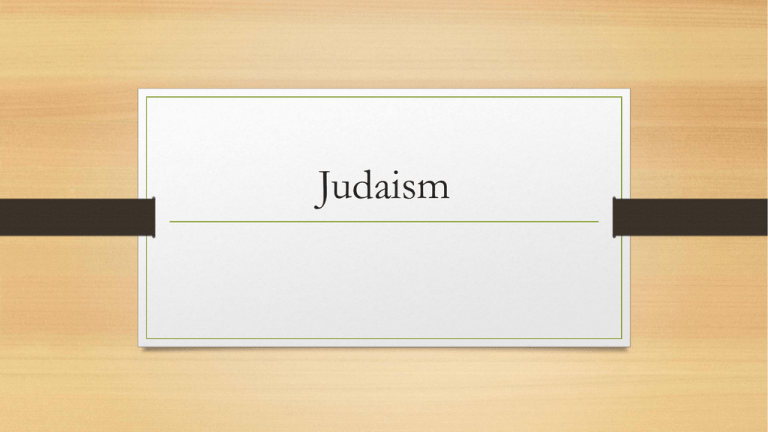
Judaism Belief in One God • Jews believe in One God this is called monotheism. • It is the oldest monotheistic religion still practiced today. • The belief in One God set Judaism apart from other religions in the ancient world. • Jews believed that God guided their history through His relationship with Abraham and Moses. Education • Teaching children the basics of Judaism is important in Jewish society. • In ancient times, older boys, not girls, would study the religion with professional teachers. • Education is still important to the religion today. Justice and Righteousness • • • • • Justice means kindness and fairness in dealing with other people. Jews believe everyone deserves fairness, even strangers and criminals. Jews must give aid to the needy, including the poor, the sick, and orphans. Righteousness refers to doing what is proper. Jews are supposed to behave properly even if those around them are not. Observance of Religious and Moral Law • Jews believe God gave them laws to follow. • The most important laws are the Ten Commandments. They believe God not only gave Moses the Ten Commandments but also a whole system of laws known as Mosaic law. • Mosaic law guides many areas of everyday life. For example, Jews cannot work on holidays or the Sabbath. • Orthodox Jews still follow Mosaic laws today. Reform Jews do not follow ancient laws and Conservative Jews fall in between these two groups. The Torah • The Torah is the most sacred text of Judaism. It consists of five books in which Jews recorded their laws. • Today in synagogues, or Jewish house of worship, the Torah is read. The Hebrew Bible • The Hebrew Bible is made up of three parts. • The Torah • Eight books the messages of Jewish prophets. • Eleven books of poetry, songs, stories, lessons, and history. The final part of the Hebrew Bible contains proverbs, or short expressions of Jewish wisdom. It also contains the Book of Psalms which are poems or songs that praise God. Commentaries • Many Jewish laws are difficult to understand. Scholars write commentaries to explain the laws. • They are found in the Talmud. Jewish Teachings in Western Society • A. Laws - The Ten Commandments for example. • B. Rules of Behavior – People give to charities for example. • C. Helped to shape Christianity and Islam. 1. Why was the discovery of the Dead Sea Scrolls so significant? For Jews? For Christians? • They include the earliest surviving manuscripts of works later included in the Hebrew Bible, plus others that illustrate the diversity of religious thought at that time in history. They reveal a greater diversity of Jewish customs and beliefs. These scrolls additionally describe beliefs and practices that early Christians adopted, 2. Describe the different theories that explain who wrote the Dead Sea Scrolls. One camp believes they can be identified with Jews fleeing Jerusalem during the First Jewish-Roman War (66-73 CE). Another attributes their origin to one or another Jewish mystic sects that lived in Qumran around the same time. They believe that Qumran may have consisted of a community of people who separated themselves from the mainstream of Jewish religion in Jerusalem. 3. What conditions contributed to the pristine condition in which the Dead Sea Scrolls were initially discovered? How are they preserved today? • The texts were initially quite well preserved. This was due to the dry and low humidity conditions in this desert area, and because of their placement into clay jars in the far recesses of caves, where the low airflow worked well in favor of preservation. • The majority of the Dead Sea Scrolls collection is housed today in the Shrine of the Book, a part of the Israel Museum in Jerusalem, where the Israeli Antiquities Authority is working with Google to digitize all the scrolls by 2016. Some of the scrolls are also housed in the Jordan Museum in Amman, including the Copper Scroll. Parts of the collection have also travelled to temporary exhibitions around the world, and have been published in facsimile in print and on CD-ROM in order to reach a broader audience. 4. How do scientists determine when the scrolls were written? • Historians were able to assign dates to the scrolls by performing carbon date tests on the parchment, and by analyzing the handwriting in terms of size and style of the text. They also analyzed the language found in the texts, and examined the various materials used to create the ink that was applied to the scrolls. Using these methods scholars have determined that the scrolls were written between the third century BCE and the first century CE. 5. What stories do the Dead Sea Scrolls tell? Why is their discovery important? • One point scholars can agree on is that the Dead Sea Scrolls offer important insights into a period of history when the Bible’s text as we know it today was still being written, and the Roman conquest of the area caused an enormous upheaval within the Jewish establishment of the time. The significance of the scrolls is perhaps that they reveal a greater diversity of Jewish customs and beliefs.
